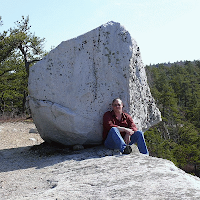A massive 8.8 magnitude earthquake hit Chile at 0634 UTC (1:34 am EST) today (Saturday, February 27). Click on the link for information from the National Earthquake Information Center (NEIC). The epicenter was offshore about 200 miles SW of Santiago. The depth was 35 km (a bit over 20 miles). Since the initial earthquake, as of 7:00 pm EST as I write this, there have been 7 aftershocks greater than magnitude 6 and dozens greater than magnitude 5.
Coastal Chile is no stranger to earthquakes. The largest historic earthquake in the world was the Chilean Valdivia Earthquake of May 22, 1960 with a magnitude 9.5 on the moment magnitude scale (most people don't realize that seismologists don't use the Richter scale anymore - I'll write about this at some point). The 1960 earthquake spawned a tsunami that killed some 200 people in Hawaii, Japan, and the Philippines - a concern today and the Tsunami Warning Center issued a warning for the Pacific basin.
Why are there big earthquakes in Chile? Plate tectonics. A large slab of the Pacific Ocean floor off western South America called the Nazca Plate is sliding (subducting) underneath South America. The boundary between the Nazca and South American plates is a deep seafloor trench called the Peru-Chile Trench and the plates are converging at a rate of about 8 cm/yr. As the plate slides down into the trench (and ultimately into the Earth's mantle beneath), it sticks. Stress builds up over the years and eventually something snaps and the plate slips a few meters. Seismic waves of energy radiate outward in an earthquake. The 1960 earthquake, for example, released 250-350 years worth of plate movement in a few seconds.
Today's earthquake occured right between the 1960 earthquake to the south and an earlier 8.5 earthquake in November, 1922 to the north. It's a portion of the subducting plate that hasn't slipped in a while. While no one can yet predict when an earthquake will occur in a specific area, geologists certainly aren't surprised by this one.
Saturday, February 27, 2010
Subscribe to:
Post Comments (Atom)



No comments:
Post a Comment